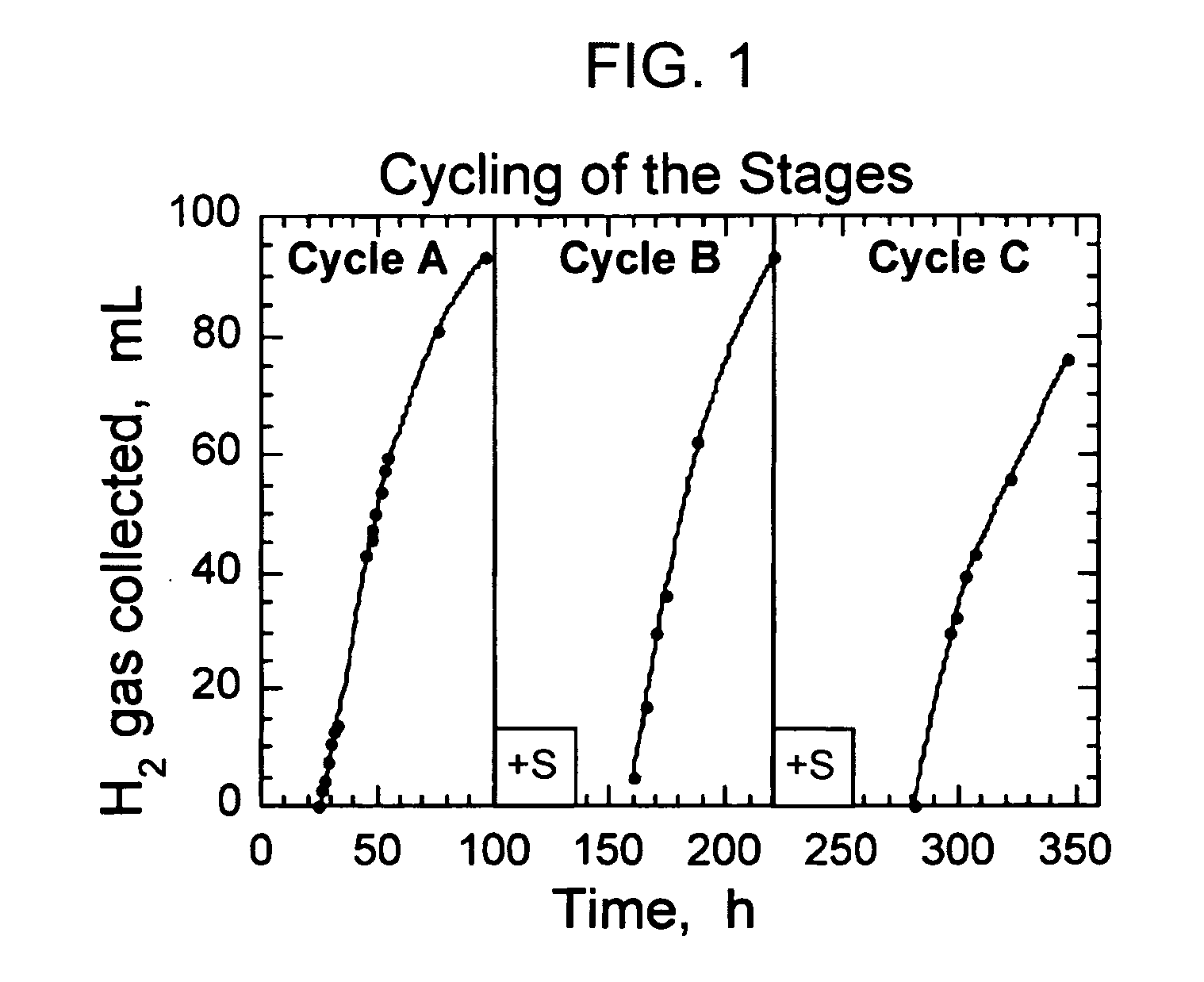Modulation of sulfate permease for photosynthetic hydrogen production
a technology of sulfate permease and hydrogen production, which is applied in the field of hydrogen gas generation, can solve the problems of low homology, low degree of homology, and inactive hydrogen, and achieve the effect of high homology
- Summary
- Abstract
- Description
- Claims
- Application Information
AI Technical Summary
Benefits of technology
Problems solved by technology
Method used
Image
Examples
example 1
Materials and Methods
[0166] The green alga Chlamydomonas reinhardtii was grown mixotrophically in a Tris-Acetate-Phosphate (TAP) medium, pH 7 (Gorman and Levin (1996)), either in liquid cultures or on 1.5% agar plates. Liquid cultures were grown on TAP or TAP with modified sulfate concentration as specified, at 25° C. in flat bottles with stirring or flasks with shaking under continuous illumination at approximately 20 μmol of photons m−2s−1. Culture density was measured by cell counting using a Neubauer ultraplane hemacytometer and a BH-2 light microscope (Olympus, Tokyo). Cells were grown to the early logarithmic phase (about 1-2×106 cells / ml) for all photosynthesis measurements.
[0167] Oxygen evolution activity of the cultures was measured with a Clark-type oxygen electrode illuminated with a slide projector lamp. Yellow actinic excitation was provided by a CS 3-69 Corning cut-off filter. Measurement of the light-saturation rate of photosynthesis was implemented with the oxygen ...
example 2
C. reinhardtii Fractionation Studies
[0173] Cells were grown under 12 h: 12 h light / dark cycles in TAP medium to the early log phase until they reached a cell density of 1-2×106 cells / ml. Chloroplasts were isolated according to the method described by Mason et al. (1991) Plant Physiol. 97:1576-1580. Intact chloroplasts were collected from the 45 to 65% interface of Percoll centrifugation gradients. After washing twice with buffer (300 mM sorbitol, 50 mM Hepes-KOH, pH 7.5, 2 mM Na-EDTA, 1 mM MgCl2), the intact chloroplasts were lysed hypotonically by suspension in a 50 mM Hepes-KOH, pH 7.5, 2 mM MgCl2 buffer. The crude chloroplast membrane fraction was collected from the pellet at the bottom of the gradient. Membranes were dissolved in solubilization buffer and analyzed by SDS-PAGE.
Construction of Antisense-CrcpSulP Plasmid and Generation of Antisense Transformants
[0174] The anti-SulP plasmid (pAntiSulp) employed in this work was constructed by placing a partial sequence of the Crc...
example 3
Sulfate Uptake and 35S-Pulse Labeling
[0176] Sulfate uptake experiments were carried out (Yildiz et al. (1994) Plant Physiol. 104:981-987) with the following modifications. Cells were grown under continuous illumination at approximately 50 μmol of photons m−2s−1 to a density of 1-2×106 cells / ml. Cells were pelleted and washed twice with TAP (TAP-S400). Cells were finally suspended in the wash medium at a cell density of 0.5×106 cells / ml. Samples were placed under illumination for 24 h prior to the 35S-sulfate uptake experiments. Prior to sulfate uptake experiments, cells were centrifuged and washed twice with TAP-S0 (Tris-Acetate-Phosphate medium without sulfate) and concentrated by about 10-fold to a density of 2-3×107 cells / ml in TAP-S0 medium. 1.25 ml of the concentrated cell suspension was then transferred into a glass vial, stirred under continuous illumination of 200 μmol of photons m−2s−for 2 min, followed by addition of 50 μl of 35S—Na2SO4 (NEN, specific activity of 560 μCi / ...
PUM
| Property | Measurement | Unit |
|---|---|---|
| pH | aaaaa | aaaaa |
| Tm | aaaaa | aaaaa |
| Tm | aaaaa | aaaaa |
Abstract
Description
Claims
Application Information
 Login to View More
Login to View More - R&D
- Intellectual Property
- Life Sciences
- Materials
- Tech Scout
- Unparalleled Data Quality
- Higher Quality Content
- 60% Fewer Hallucinations
Browse by: Latest US Patents, China's latest patents, Technical Efficacy Thesaurus, Application Domain, Technology Topic, Popular Technical Reports.
© 2025 PatSnap. All rights reserved.Legal|Privacy policy|Modern Slavery Act Transparency Statement|Sitemap|About US| Contact US: help@patsnap.com



